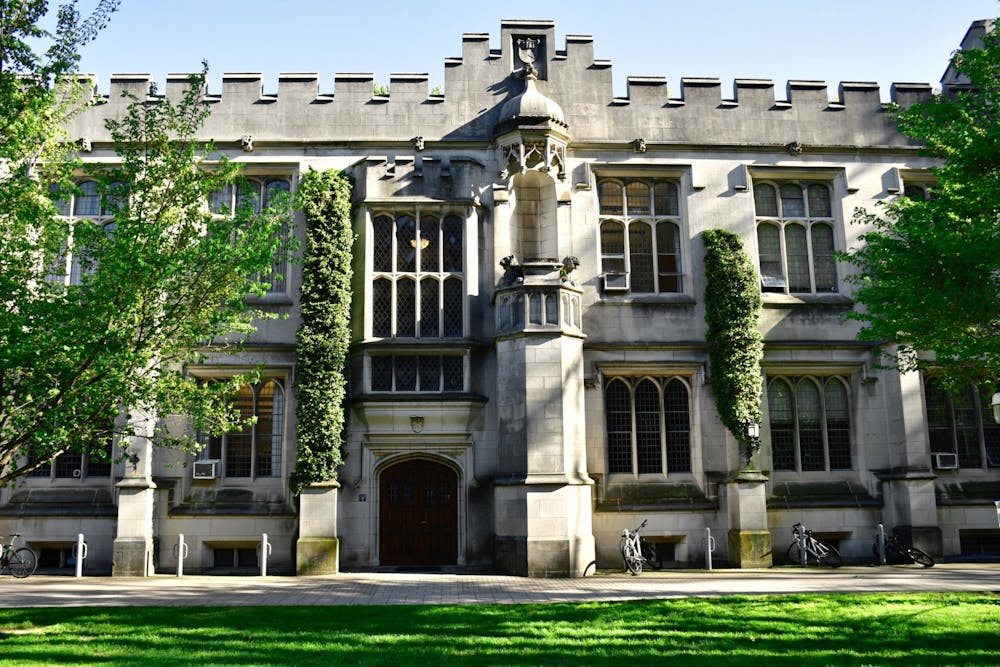The following is a guest contribution and reflects the authors’ views alone. For information on how to submit an article to the Opinion Section, click here.
This letter was submitted to administrators on Tuesday, Aug. 24.
From the members of the English Department Faculty
Given the surge of the Delta variant and the rise of breakthrough cases among the vaccinated, we call upon the University to reverse its policy compelling universal in-person teaching this Fall irrespective of health conditions.
Delta: What we know
The University is relying on vaccination and testing to keep the community safe. Yet new findings from studies in Israel and the CDC show that the Delta variant is twice as infectious and can overcome the protection of vaccines at rates that cannot be ignored.
According to “Nature,” studies show that vaccinated people “can carry as much virus in their nose as do unvaccinated people,” thus spreading the virus to others.
The University testing system does not protect the community against those who, infected shortly after being tested and remaining asymptomatic, will unknowingly spread the virus before being tested in the following week.

Since May 1, 2021, the CDC has tracked only those breakthrough cases resulting in hospitalization and death, classifying all other cases as “mild.” But “mild” underplays the risks of “long COVID” for patients, hospitalized or not. These include increased risk of stroke, heart disease, kidney disease, neurological damage, chronic joint pain, acute respiratory distress syndrome, brain fog, memory loss, and chronic fatigue.
Many of us were vaccinated seven, and even eight, months ago; and for this group the vaccine’s prophylactic capacities have diminished significantly. By mid-semester, this will be true for nearly all vaccinated faculty. Booster shots for the most vulnerable will not be available until late in the semester.
Where we are
We prefer teaching in person, but the safety of the entire community comes first. Within our department alone, we have faculty who are immunocompromised, others who are living in households with immunocompromised family members, and many caring for unvaccinated children who are both vulnerable to the virus and capable of conveying it. Faculty who commute to the University on public transit will also bring the virus into the classroom.

Risk is significantly compounded by the fact that McCosh Hall is one of numerous buildings without safe teaching spaces. None of its classrooms have adequate ventilation and, with no social distancing, students and teachers will be sitting closely together for periods of up to three hours. All day students will be crowding unventilated stairways and corridors leading to McCosh lecture halls. The windowless basement rooms have no air circulation and yet have been assigned to our faculty and graduate teachers for the coming semester. And our staff work in shared cubicle spaces that see constant traffic throughout the day.
As we now adapt to the rapidly changing risks of the Delta variant, we need a maximum degree of flexibility in our teaching. We ask Princeton to take the lead, alongside Rutgers, Rice, Tufts, the University of Pittsburgh, and others, in allowing for remote teaching. This will enable us all both to maintain the safety of our community and properly to focus our efforts on the Department’s central mission: teaching students well.
August 23, 2021
Signed:
Eduardo Cadava, Philip Mayhew Professor of English
Anne Anlin Cheng ’85, Professor of English
Andrew Cole, Woodrow Wilson Professor of Literature | Professor of English
Bradin Cormack, Professor of English
Maria DiBattista, Charles Barnwell Straut Class of 1923 Professor of English
Jeff Dolven, Professor of English
Diana Fuss, Louis W. Fairchild Class of ’24 Professor of English
Simon Gikandi, Robert Schirmer Professor of English
William Gleason, Hughes-Rogers Professor of English and American Studies
Claudia L. Johnson, Murray Professor of English Literature
Rhodri Lewis, Senior Research Scholar/Lecturer with Rank of Professor
Rob Nixon, Barron Family Professor in Humanities and the Environment | Professor of English
Jeff Nunokawa, Professor of English
Gayle Salamon, Professor of English and Program in Gender and Sexuality Studies
Esther Schor, Leonard L. Milberg ’53 Professor of American Jewish Studies | Professor of English
Nigel Smith, William and Annie S. Paton Foundation Professor of Ancient and Modern Literature | Professor of English
D. Vance Smith, Professor of English
Susan Stewart, Avalon Foundation University Professor of the Humanities | Professor of English
Susan Wolfson, Professor of English
Zahid R. Chaudhary, Associate Professor of English
Sophie Gee, Associate Professor of English
Russ Leo, Associate Professor of English
Meredith Martin, Associate Professor of English
Tamsen Wolff, Associate Professor of English
Sarah Chihaya, Assistant Professor of English
Monica Huerta, Assistant Professor of English and American Studies
Christina León, Assistant Professor of English
Paul Nadal, Assistant Professor of English and American Studies
Robbie Richardson, Assistant Professor of English
Autumn Womack, Assistant Professor of English and African American Studies
Sarah M. Anderson, Lecturer in English and Program in Medieval Studies
Rebecca Rainof, Research Scholar in English
April Alliston, Professor of Comparative Literature | Affiliate Faculty in English
Anne McClintock, A Barton Hepburn Professor in Gender and Sexuality Studies | Affiliate Faculty in English
Fintan O’Toole, Leonard L. Milberg ’53 Visiting Professor of Irish Letters | Affiliate Faculty in English
Evie Shockley, Bain-Swiggett Visiting Professor of Poetry & Poetics (Fall 2021)
Editor’s Note: This article has been updated to reflect that 36 English Department faculty signed this letter, not 37, as previously stated. The ‘Prince’ regrets this error.








